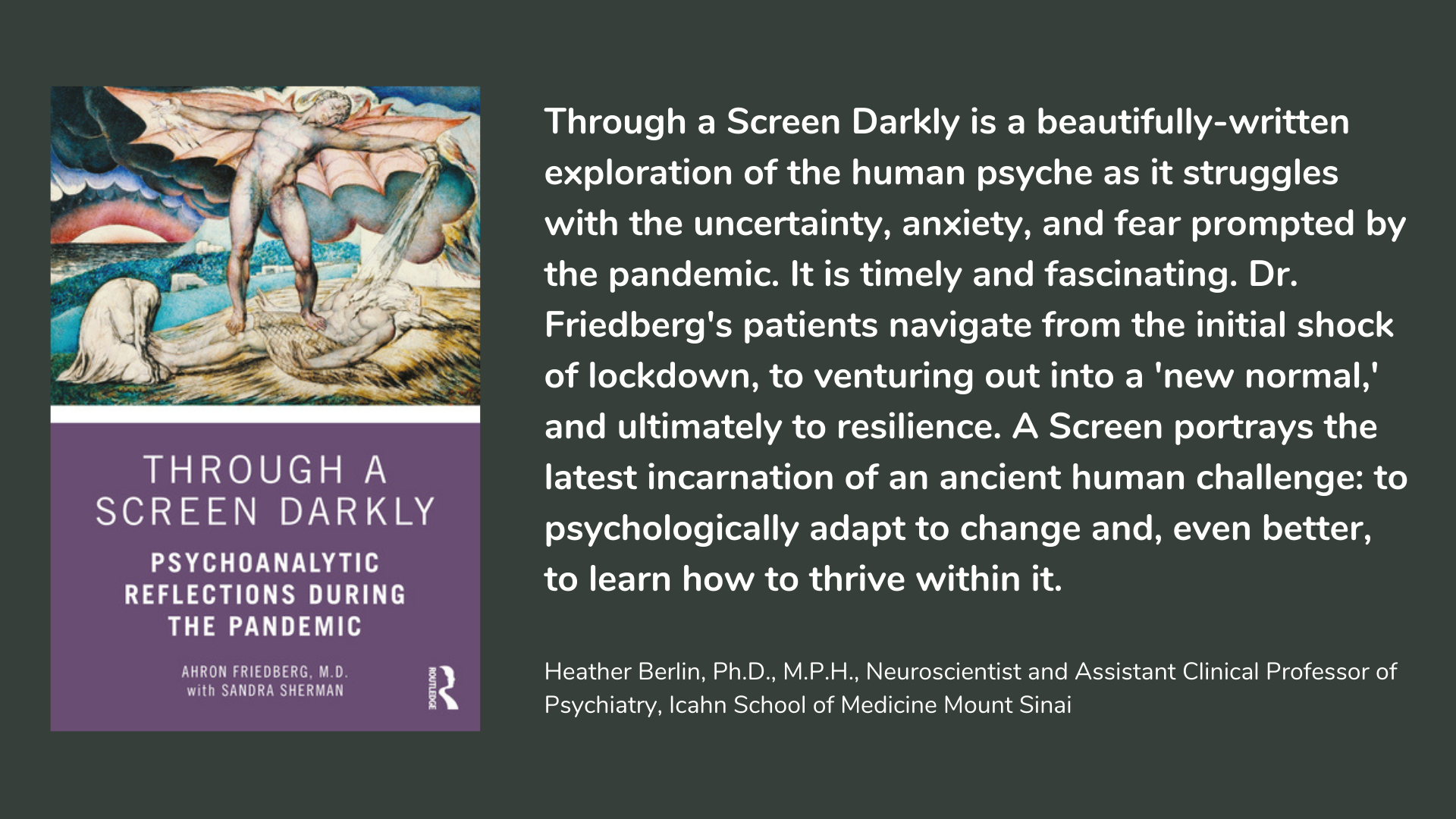Through a Screen Darkly
Psychoanalytic Reflections During the Pandemic
Ahron Friedberg, M.D. with Sandra Sherman
Through a Screen Darkly provides intimate reflections on Dr. Ahron Friedberg's patients as they deal with the mental health consequences of the pandemic.
The book identifies the psychological distress caused by the pandemic, examining how the elements of COVID-19--its ability to be spread by those who seem not to have it, its intractability, the long-term uncertainty it engenders--leave relatively stable people shaken and unsure of the future. At
The title is taken from the Biblical phrase "through a glass darkly," 1 Corinthians 13:12, where Saint Paul suggests that our vision of reality is clouded. It applies because during the period covered in the book, Dr. Friedberg practiced remotely, via literal screens. Such screens had a dual function: on the one hand, they made possible whatever vision we had but, on the other, served as a barrier that kept people apart.
A Screen offers a series of intense, immediate encounters with worried, traumatized people. It shows them learning to navigate their uncertain circumstances, a process that will continue beyond the timeframe of the book but that begins to signify how larger scale adaptations will ultimately take place.
About sixty essays record the anxiety, fear, and modalities of coping that characterized how we lived these phenomena in real time.
The book demonstrates that, of necessity, we learn to adapt. Even though we can only see "darkly," we can call on resources we do have, as well as those we can acquire, to retain our sense of dignity and purpose. A Screen makes no predictions as to how this will all play out; rather, it is a time capsule of how we struggled through a disease that we still do not fully understand.
This book is invaluable for anyone who lived through this moment. It points to the several possible directions for our national, psychological recovery, in a format rich with first-hand stories that are highly relatable.
Synopsis
Introduction - This sets out the significance of the "screen" (see above), that is, as the vehicle through which a psychiatrist to intimately engages a patient even while neither shares the same physical space.
Part I (Pandemic) -This emphasizes how Dr. Friedberg's patients attempt to find hope amid catastrophe at the outset of the pandemic. Some stories include: Alone; The Virus as Muse; Honesty; Physicians and Stress; Parents; Risk and the Pandemic
Part II (Venturing Out) - This includes essays that involve reconnecting, gingerly, with others and oneself after prolonged isolation. It also explores Dr. Friedberg's use of poetry as a means towards personal resilience. Some stories include: Silence; Writing the Pandemic; Looking for a Job; Father's Day; Commute or Not.
Part III (The New Normal) - This addresses our getting used to (as well as resisting) change, in areas such as dating and travel, with a particular emphasis on the problems of transition. Some stories include: Returning to the Office; Throwing Pots; Writer's Block; Elderly Parents.
Part IV (Life, Simplified - not really) - This examines the complications of living with fewer choices after we've become accustomed to so many. But there are compensations (or, at least, adjustments). With fewer distractions, Dr. Friedberg's patients cultivate more satisfying connections and become more introspective. Some stories include: Parting Ways; Vigilance; Getting Old; Second Chances; Acceptance.
Reflections - The book concludes with Dr. Friedberg's reflections on what he learned during the experience, and what he anticipates, as he continues to observe the impact of COVID-19 on his patients and himself.

Ahron Friedberg, M.D., is Clinical Professor of Psychiatry at Mount Sinai Icahn School of Medicine, New York, and served twice as President of the American Society of Psychoanalytic Physicians. He is Editor of American Academy of Psychodynamic Psychiatry and Psychoanalysis Forum, Book Editor of Psychodynamic Psychiatry, and a regular contributor to Psychology Today.
In addition to Through a Screen Darkly, Dr. Friedberg has also written Flashing Seven: Seven Essential Skills for Living and Leading, co-authored with Dr. Jack Hischowitz, Clinical Professor at Mount Sinai, Between Us: A Father and Son Speak, co-authored with his father, Dr. Eugene Friedberg; and Psychotherapy and Personal Change; Two Minds in a Mirror, with Dr. Sandra Sherman.
Sandra Sherman, J.D., Ph.D., was a Senior Attorney in the U.S. government and Professor of English at two major universities. She is the author of four books and over 60 peer-reviewed articles on 18th-century literature and culture and has co-authored several books on neuroscience. She currently works with scientists and physicians to support their research and writing.





